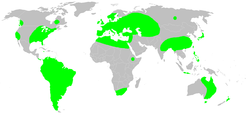Pholcus phalangioides
| Pholcus phalangioides | |
|---|---|
 |
|
| With cranefly prey | |
| Scientific classification | |
| Kingdom: | Animalia |
| Phylum: | Arthropoda |
| Class: | Arachnida |
| Order: | Araneae |
| Suborder: | Araneomorphae |
| Family: | Pholcidae |
| Genus: | Pholcus |
| Species: | P. phalangioides |
| Binomial name | |
|
Pholcus phalangioides Fuesslin, 1775 |
|
 |
|
Pholcus phalangioides, known as the longbodied cellar spider or the skull spider due to its cephalothorax looking like a human skull, is a spider of the family Pholcidae. Females have a body length of about 9 mm; males are slightly smaller. Its legs are about 5 or 6 times the length of its body (reaching up to 7 cm of leg span in females). Its habit of living on the ceilings of rooms, caves, garages or cellars gives rise to one of its common names. They are considered beneficial in some parts of the world because they kill and eat other spiders, including species that can be considered a problem to humans such as hobo and redback spiders.
This is the only spider species described by the Swiss entomologist Johann Kaspar Füssli, who first recorded it for science in 1775. Confusion often arises over its common name, because "daddy long-legs" is also applied to two other distantly related arthropods: one being Opiliones, another order of arachnid known also as a "harvestman", the other an insect less ambiguously called the crane fly.
Originally a species restricted to warmer parts of the west Palearctic, through the help of humans this synanthrope now occurs throughout a large part of the world. It is unable to survive in cold weather, and consequently it is restricted to (heated) houses in some parts of its range.
Pholcus phalangioides is not considered aggressive, its first line of defense being to shake its web violently when disturbed as a mechanism against predators. It can easily catch and eat other spiders (even those much larger than itself, such as Eratigena atrica), mosquitoes and other insects, and woodlice. When food is scarce, it will prey on its own kind. Rough handling will cause some of its legs to become detached.
...
Wikipedia
